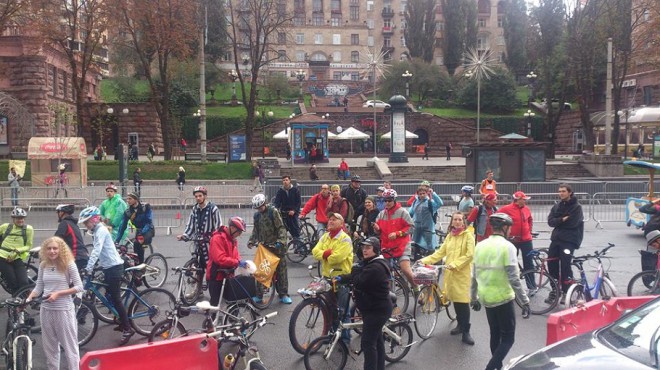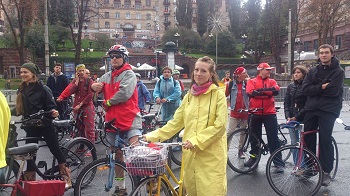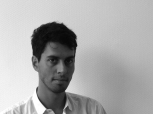
Ukraine’s Sole Transport and Cycling Tourism Advocacy Voice Successfully Obtains EU Grant
 Member of the Month: how the Kyiv Cyclists’ Association has used the resources it got from the bicycle industry to bid for and obtain an EU grant, setting up a virtuous circle that has already multiplied by more than eightfold the initial amount received.
Member of the Month: how the Kyiv Cyclists’ Association has used the resources it got from the bicycle industry to bid for and obtain an EU grant, setting up a virtuous circle that has already multiplied by more than eightfold the initial amount received.
ECF December’s Member of the Month is the Kyiv Cyclists’ Association (AVK), the sole advocacy voice for transport and tourism cycling in Ukraine, a country of 46 million people, twice as big as Italy, twice as populated as Australia.
This is the story of a small organization doing very well in the tough Ukrainian cycling environment – the story of how AVK used the resources it got from the bicycle industry to bid for and eventually obtain an EU grant, setting up a virtuous circle that has already multiplied by more than eightfold the initial amount received. This is happening in a country with a vast and largely unexploited cycling potential: a shining example of how investing in great people with a vision can lead to rich returns.
New friends
In 2011, a new group of advocates joined the ECF at the Annual General Meeting in Seville. These fresh faces showed a passion for cycling advocacy and a determination to create change in their city and country. AVK had joined ECF, and recognizing their potential ECF staff started supporting Veloforum, Ukraine’s first ever transport and tourism cycle conference, modelled on Velo-city.
The SRAM cycling fund and the ECF’s Leadership Programme
The “Leadership Programme” is the ECF-led grants scheme aimed at small-to-medium sized organisations with a potential to significantly increase the impact of advocacy in their country. A pilot project was run in 2012 with the help of an investment from the SRAM Cycling Fund. With the good contacts of the ECF and the success of Veloforum, AVK was selected as one of grantees and received a first EUR 15,000 donation. The programme was replicated in 2013, this time with funds made available by the Cycle Industry Club, the ECF-coordinated network of bike industry players: AVK got into the programme again, obtaining additional EUR 15,000. Things started shaping up nicely in Kiev.
Setting up an organization in a country with low bike culture
The Leadership Programme grants provided AVK with a chance to shift to a more professional approach. They can now have paid staff and invest in communications, campaigning and research. The reports that Leadership Programme beneficiaries are required to produce twice a year show how the business plan is being executed and the improvements pile up. The new website attracts twice as many users as the previous release. Bike mentoring programs in Kiev are launched. Paid staff members can now manage memberships, work on road safety and infrastructure legislation, organize campaigns, and have documents translated into English. Two bike parades are held yearly in four cities to claim more rights for cyclists. Media-savvy Kieviens know how attract TVs to their colourful bike festivals, and now have the resources to cultivate relations with the media. AVK stands as the cycling champion. Its members are invited to take part in urban planning sessions at the City Hall. They are making it into the policy-makers agendas. Phase 1 is done, the donors expectations fulfilled.
Good Neighbour Relations: raising the bar for advocacy
What is making AVK go to the next level is the (take a deep breath now) “Neighbourhood Civil Society Facility 2012 and Non-State Actors and Local Authorities in Development (NSA&LA) 2012 and 2013”. This programme allocates EUR 3,044,862 to non-profit associations working to promote – among the other things – “the involvement of civil society actors in policy dialogue with public authorities on implementation of sector strategies in environment; energy; transport (...); regional development; rural development” on the Ukrainian territory. The program falls in the European Neighbourhood and Partnership Instrument, the EU’s expenditure tool to support Eastern and Mediterranean countries lying beyond its borders. When the call for proposal was issued last spring, AVK wasted no time: it teamed up with the “Center for Social and Business Initiatives” (an economic development NGO based in Yaremche, Western Ukraine) and with the ECF and together they applied for a grant, submitting a composite project. A few weeks ago they learnt they had nailed it: EUR 250,000, covering most of the approx. EUR 300,000 budgeted by AVK and CSBI for the whole development scheme.
Where will the money go?
“The aim is to strengthen cycling policy at national and regional level in Ukraine” – says Project Coordinator Ksenia Semenova “and there’s a whole lot to do here. We need to keep up the development of cycling advocacy in Kiev, to begin with”. “We can now assist cities willing to develop their cycling plans” – adds Ira Bondarenko, AVK Coordinator. “We can build public demand for cycling policies, advocate for cycling infrastructure, improve local cycling NGOs’ rate of fire. We now have the resources to improve the level of our annual bike-conference Veloforum”.
Paying dividends
Bike culture - including a bike market - is not built overnight. Still, it seems the virtue cycle is ignited here. Small payments by the industry allow advocacy organizations to hire staff. This brings capacity to address bigger issues, and to then bid for more funding. Grants help the organizations improve. With this capacity the advocates have a platform to make the case for city and national investments in cycling. More people enjoying cycling, and this leads to increased bike sales and consequent revenues for the industry.
- Log in to post comments
Contact the author
Recent news!
Upcoming events
Contact Us
Avenue des Arts, 7-8
Postal address: Rue de la Charité, 22
1210 Brussels, Belgium











